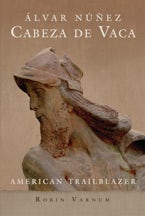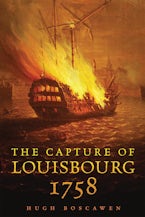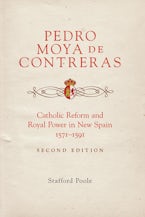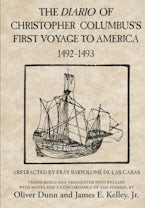HISTORY / Americas (North, Central, South, West Indies)
Showing results 1-8 of 8
Filter Results OPEN +

The Stations of the Cross in Colonial Mexico
The Via crucis en mexicano by Fray Agustin de Vetancurt and the Spread of a Devotion
In Schwaller’s deft analysis—which extends from the origins of the devotion, to the processions and public rituals of the Mexica (Aztecs), to the text and illustrations of the Vetancurt manuscript—the Via crucis en mexicano opens a window on the practice and significance of the Stations of the Cross—and of private devotions generally—in Mexico, Hispanic America, and around the world.
Álvar Núñez Cabeza de Vaca
American Trailblazer
In July 1536, Álvar Núñez Cabeza de Vaca (c. 1490–1559) and three other survivors walked 2,500 miles from Texas, across northern Mexico, to Sonora and ultimately to Mexico City. Cabeza de Vaca’s account of this astonishing journey is now recognized as one of the great travel stories of all time. Robin Varnum’s biography, the first single-volume cradle-to-grave account of the explorer’s life in eighty years, tells the rest of the story.
The Capture of Louisbourg, 1758
Boscawen, an experienced soldier and sailor, and a direct descendant of Admiral the Hon. Edward Boscawen, who commanded the Royal Navy fleet at Louisbourg, examines the pivotal 1758 Louisbourg campaign from both the British and French perspectives. Drawing on myriad primary sources, including previously unpublished correspondence, Boscawen also answers the question "What did the soldiers and sailors who fought there do all day?" The result is the most comprehensive history of this strategically important campaign ever written.
Pio Pico
The Last Governor of Mexican California
Two-time governor of Alta, California and prominent businessman after the U.S. annexation, Pío de Jesus Pico was a politically savvy Californio who thrived in both the Mexican and the American periods. This is the first biography of Pico, whose life vibrantly illustrates the opportunities and risks faced by Mexican Americans in those transitional years.
Pedro Moya de Contreras
Catholic Reform and Royal Power in New Spain, 1571–1591 Second Edition
For a brief few years in the sixteenth century, Pedro Moya de Contreras was the most powerful man in the New World. A church official and loyal royalist, he came to Mexico in 1571 to establish the Inquisition and later became archbishop and viceroy for the region. This new edition of Stafford Poole's definitive portrait of Moya de Contreras, first published in 1971, now offers an expanded understanding of this enigmatic figure's influence on the development of New Spain.
The Mapping of the Entradas into the Greater Southwest
In this groundbreaking and lavishly illustrated volume edited by Dennis Reinhartz and Gerald D. Saxon, five leading scholars in history, geography, and cartography discuss the role Spanish explorers...
Inventing America
Spanish Historiography and the Formation of Eurocentrism
In Inventing America, José Rabasa presents the view that Columbus’s historic act was not a discovery, and still less an encounter. Rather, he considers it the beginning of a process of inventing...
The Diario of Christopher Columbus's First Voyage to America, 1492–1493
As the Quincentennial Celebration of Christopher Columbus’s discovery of America approaches, interest in the voyage, and in the questions surrounding it, continues to grow. This definitive edition...

The Stations of the Cross in Colonial Mexico
The Via crucis en mexicano by Fray Agustin de Vetancurt and the Spread of a Devotion
In Schwaller’s deft analysis—which extends from the origins of the devotion, to the processions and public rituals of the Mexica (Aztecs), to the text and illustrations of the Vetancurt manuscript—the Via crucis en mexicano opens a window on the practice and significance of the Stations of the Cross—and of private devotions generally—in Mexico, Hispanic America, and around the world.
Álvar Núñez Cabeza de Vaca
American Trailblazer
In July 1536, Álvar Núñez Cabeza de Vaca (c. 1490–1559) and three other survivors walked 2,500 miles from Texas, across northern Mexico, to Sonora and ultimately to Mexico City. Cabeza de Vaca’s account of this astonishing journey is now recognized as one of the great travel stories of all time. Robin Varnum’s biography, the first single-volume cradle-to-grave account of the explorer’s life in eighty years, tells the rest of the story.
The Capture of Louisbourg, 1758
Boscawen, an experienced soldier and sailor, and a direct descendant of Admiral the Hon. Edward Boscawen, who commanded the Royal Navy fleet at Louisbourg, examines the pivotal 1758 Louisbourg campaign from both the British and French perspectives. Drawing on myriad primary sources, including previously unpublished correspondence, Boscawen also answers the question "What did the soldiers and sailors who fought there do all day?" The result is the most comprehensive history of this strategically important campaign ever written.
Pio Pico
The Last Governor of Mexican California
Two-time governor of Alta, California and prominent businessman after the U.S. annexation, Pío de Jesus Pico was a politically savvy Californio who thrived in both the Mexican and the American periods. This is the first biography of Pico, whose life vibrantly illustrates the opportunities and risks faced by Mexican Americans in those transitional years.
Pedro Moya de Contreras
Catholic Reform and Royal Power in New Spain, 1571–1591 Second Edition
For a brief few years in the sixteenth century, Pedro Moya de Contreras was the most powerful man in the New World. A church official and loyal royalist, he came to Mexico in 1571 to establish the Inquisition and later became archbishop and viceroy for the region. This new edition of Stafford Poole's definitive portrait of Moya de Contreras, first published in 1971, now offers an expanded understanding of this enigmatic figure's influence on the development of New Spain.
The Mapping of the Entradas into the Greater Southwest
In this groundbreaking and lavishly illustrated volume edited by Dennis Reinhartz and Gerald D. Saxon, five leading scholars in history, geography, and cartography discuss the role Spanish explorers...
Inventing America
Spanish Historiography and the Formation of Eurocentrism
In Inventing America, José Rabasa presents the view that Columbus’s historic act was not a discovery, and still less an encounter. Rather, he considers it the beginning of a process of inventing...
The Diario of Christopher Columbus's First Voyage to America, 1492–1493
As the Quincentennial Celebration of Christopher Columbus’s discovery of America approaches, interest in the voyage, and in the questions surrounding it, continues to grow. This definitive edition...









